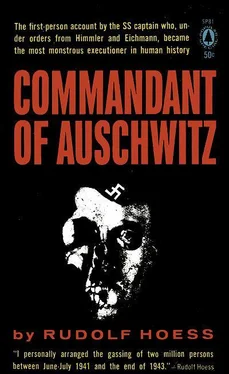I spent a lot of time traveling on duty. This was usually at Pohl’s request, for he regarded me as an expert on what went on inside the camps.
I was thus able to see the reality in the camps, the hidden defects, and shortcomings. Maurer of DII [86]was Glucks’s deputy and virtually the Inspector, and he and I were able to put right much that was wrong. But by 1944 it was too late for drastic change. The camps became increasingly overcrowded, with all the usual by-products that followed this state of affairs.
It is true that tens of thousands of Jews were moved from Auschwitz for the new armaments project, but this was only a question of out of the frying pan and into the fire. Knocked together with great speed and under unbelievably difficult conditions, the buildings, constructed by officials exactly in accordance with the principles laid down in the manuals, presented a picture of unrelieved squalor. In addition there was the heavy work to which the prisoners were unaccustomed and the ever diminishing scale of rations. The prisoners would have been spared a great deal of misery if they had been taken straight into the gas chambers at Auschwitz. They soon died, without making any substantial contribution to the war effort and often without having done any work at all.
I drafted numerous reports on the subject, but pressure on the part of the Reichsführer SS (“more prisoners for armaments”) was too strong. He was intoxicated by the weekly rise in the figures of prisoners employed. And he no longer looked at the mortality rate. In past years a rise in the death rate had always infuriated him. Now he said nothing.
If Auschwitz,had followed my constantly repeated advice, and had only selected the most healthy and vigorous Jews, then the camp would have produced a really useful labor force and one that would have lasted, although it is true that it would have been numerically smaller. As it was, the numbers on paper were high, but a majority percentage had to be subtracted to obtain a true picture. The sick cluttered up the camps, depriving the able-bodied of food and living space and doing no work, and in fact their presence made many of those who could work incapable of it.
No slide rule was necessary to calculate what the final result would be. But I have already said enough about this, and have written a detailed account in my descriptions of the various persons concerned. [87]
By reason of my appointment I was now in more immediate and direct contact with the Reich Security Head Office. I got to know all the influential officials in the various departments responsible for the concentration camps.
Their views, however, varied from office to office. I have already given a detailed account of the chief of Amt IV [88], but I was never able to discover his own real opinions, since he hid behind the Reichsführer SS.
Subsection IVb (Protective Custody) was still bogged down in its old, prewar routine. [89]
A great deal of energy was devoted to fighting the paper war and far too little to the actual requirements of the real war. Many officials in this subsection should have been dismissed from their posts.
In my opinion, the arrest, on the outbreak of the war, of those public officials who had hitherto been antagonistic to the regime was a mistake. It only served to create more enemies for the state. Those who were considered untrustworthy could have been arrested much earlier, for there was plenty of time during the years of peace. But the protective custody subsection was bound by the reports of the controlling offices.
I had many struggles with this subsection, despite the fact that I was personally on good terms with its chief.
The subsection that was concerned with the Western and Northern territories, including special prisoners from these areas, was very difficult to deal with, because these territories were of direct interest to the Reichsführer SS. The greatest caution was needed here. The prisoners were to be given special consideration and employed so far as possible on lighter work, etc.
The subsection concerned with the Eastern territories was less troublesome. Eastern prisoners, apart from the Jews, formed the majority in all the camps. It was therefore they who provided the main labor force for use in the armaments program.
Execution orders came in an unending stream. Today I can see more clearly. My requests for help in remedying the deficiencies of Auschwitz by putting a stop to new deliveries were shelved by the Reich Security Head Office, since they would not, or perhaps did not wish to, show any consideration for the Poles. All that mattered was that the actions of the Security Police should be completed. What happened to the prisoners afterward was a matter of indifference to the Reich Security Head Office, since the Reichsführer SS attached no particular importance to it.
The subsection concerned with the Jews, controlled by Eichmann and Günther, had no doubts about its objective. In accordance with the orders given by the Reichsführer SS in the summer of 1941, all Jews were to be exterminated. The Reich Security Head Office raised the strongest objections when the Reichsführer SS, on Pohl’s suggestion, directed that able-bodied Jews were to be sorted out from the rest.
The Reich Security Head Office was always in favor of the complete extermination of all Jews, and saw in the creation of each new work camp and in every further thousand Jews selected for work the danger that circumstances might arise that would set them free and keep them alive.
No department had a greater interest in raising the Jewish death rate than the Jewish subsection of the Reich Security Head Office.
As against that, Pohl had been authorized by the Reichsführer SS to provide as many prisoners as possible for the armaments industry. Accordingly he laid the greatest emphasis on the delivery of the maximum number of prisoners, and this also meant that as many Jews capable of work as possible were to be removed from the transports earmarked for extermination.
He also attached the greatest importance to the preservation of this labor force alive, although without much success.
The Reich Security Head Office and the Economic Administration Head Office were thus at loggerheads.
Nevertheless, Pohl appeared to be the stronger, for he was backed by the Reichsführer SS who, bound in his turn by his promises to the Führer, was constantly and ever more urgently demanding prisoners to work in the armaments factories.
On the other hand the Reichsführer SS also wished to see as many Jews as possible destroyed.
From 1941 onward, when Pohl took over the concentration camps, the camps were incorporated into the Reichsführer SS’s armaments program.
As the war situation grew ever more total, the Reichsführer SS’s demands for prisoner labor became more ruthless.
The bulk of the prisoners were those from the East and, later, the Jews. They were mainly sacrificed to the armaments program.
The concentration camps were a hone of contention between the Reich Security Head Office and the Economic Administration Head Office.
The Reich Security Head Office delivered prisoners with the object of destroying them. It was a matter of indifference to them whether this objective was realized straight away by execution or by way of the gas chambers, or rather more slowly through diseases brought about by the unwarrantable conditions in the concentration camps, which were deliberately not put right.
The Economic Administration Head Office wanted the prisoners preserved for the armaments industry. Since, however, Pohl allowed himself to be led astray by the Reichsführer SS’s continual demands for ever more labor, he unintentionally played into the hands of the Reich Security Head Office. For because of his insistence on the fulfillment of these demands, thousands of prisoners died at their work, since virtually all the basic necessities of life for such masses of prisoners were lacking.
Читать дальше












